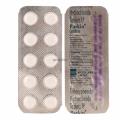Home / Categories / RELIHEXY TAB

RELIHEXY TAB
(10)
TRIHEXYPHENIDYL HYDROCHLORIDE-2MG
ANTI-PARKINSONIAN DRUGS
RELIANCE FORMULATION
Product Details
Trihexyphenidyl HCl
A to Z Drug Facts
| Trihexyphenidyl HCl |
| (try-hex-ee-FEN-in-dill HIGH-droe-KLOR-ide) |
Artane, Artane Sequels, Trihexy-2, Trihexy-5,  Aparkane, Apo-Trihex, Novo-Hexidyl, PMS-Trihexyphenidyl, Trihexyphen Aparkane, Apo-Trihex, Novo-Hexidyl, PMS-Trihexyphenidyl, Trihexyphen |
| Class: Antiparkinson/anticholinergic |
 Action Exerts direct inhibitory effect on parasympathetic nervous system by inhibiting actions of acetylcholine; has relaxing effect on smooth musculature.
Action Exerts direct inhibitory effect on parasympathetic nervous system by inhibiting actions of acetylcholine; has relaxing effect on smooth musculature.
 Indications Adjunct in treatment of all forms of parkinsonism (postencephalitic, arteriosclerotic and idiopathic); adjuvant therapy with levodopa for control of drug-induced extra-pyramidal disorders. Sustained release: Maintenance therapy after patients have been stabilized on tablets or elixir.
Indications Adjunct in treatment of all forms of parkinsonism (postencephalitic, arteriosclerotic and idiopathic); adjuvant therapy with levodopa for control of drug-induced extra-pyramidal disorders. Sustained release: Maintenance therapy after patients have been stabilized on tablets or elixir.
 Contraindications Standard considerations.
Contraindications Standard considerations.
Parkinsonism
ADULTS: PO 1 or 2 mg first day; increase by 3 mg increments at intervals of 3–5 days, until 6–10 mg given daily in divided doses. Some postencephalitic patients may require total daily dose of 12–15 mg. Usually given tid at mealtimes. High doses may be taken qid, at mealtimes and at bedtime.
Concomitant Use with Other Anticholinergics
Gradually initiate trihexyphenidyl with progressive reduction of other anticholinergic.
Drug-Induced Extrapyramidal Disorders
Amount and frequency is individualized. Start with single 1 mg dose. If symptoms are not controlled in few hours, progressively increase until controlled. Daily dosage usually ranges 5–15 mg in divided doses.
Sustained Release
Not for initial therapy. Once patient is stabilized, may switch on equipotent daily basis. Give as single dose after breakfast or in bid doses 12 hr apart.
Haloperidol: Schizophrenic symptoms may worsen; haloperidol levels may decrease and tardive dyskinesia may develop. Phenothiazines: Actions of phenothiazines may be decreased.
 Lab Test Interferences None well documented.
Lab Test Interferences None well documented.
CV: Tachycardia; palpitations; hypotension. CNS: Dizziness; nervousness; psychiatric manifestations such as delusions or hallucinations; mental confusion; agitation; disturbed behavior. DERM: Rash. EENT: Blurred vision; angle-closure glaucoma; difficulty swallowing. GI: Dry mouth; nausea; vomiting; constipation; suppurative parotitis; dilation of colon; paralytic ileus. GU: Urinary retention; urinary hesitancy; impotence. OTHER: Fever; flushing; decreased sweating; heat illness.
Pregnancy: Category C. Lactation: Undetermined. Children: Safety and efficacy not established. Elderly patients: More susceptible to adverse effects. Special risk patients: Use drug with caution in patients with tachycardia, arrhythmias, hypertension, hypotension, prostatic hypertrophy, liver or kidney disorders, obstructive disease of GI tract. Anticholinergic effect: Concomitant use of other drugs with anticholinergic effects will have additive effects. Heat illness: Give with caution during hot weather. Severe anhidrosis and fatal hyperthermia may occur. Ophthalmic: Incipient narrow-angle glaucoma may be precipitated by drug use; therefore closely monitor patient for symptoms and evaluate intraocular pressure at regular, periodic intervals.
| PATIENT CARE CONSIDERATIONS |
|
- Do not crush sustained release product or allow patient to chew.
- Store at room temperature in light-resistant container. Avoid freezing the elixir.
- Obtain patient history, including drug history and any known allergies.
- Assess Parkinson's symptoms prior to and throughout therapy.
- Implement safety precautions to prevent injury, particularly during initial therapy until individual response is determined.
- Encourage frequent oral hygiene.
- Implement measures to prevent constipation, ie, fluids, activity, dietary bulk.
- Monitor for side effects: dry mouth, nausea, dizziness, nervousness, blurred vision. If dry mouth occurs, provide patient with ice chips or sugarless hard candy or sugarless gum for comfort.
- Monitor for other anticholinergic side effects: constipation, difficulty voiding. If these effects are noted, increase patient's fluid intake and notify physician if problematic.
- Monitor vital signs per routine and more frequently when increasing dose.
- Monitor frequency of bowel movements, I&O.
- If patient complains of sudden onset of eye pain and blurred vision, discontinue drug and notify physician.
- Assess for behavioral changes, particularly in individuals with history of mental disorder.
|
||||
- Advise patient to take as directed and not to change dose unless advised by physician.
- Tell patient to be cautious during hot weather to prevent heat-related illness.
- Explain measures to prevent constipation.
- Encourage frequent oral hygiene and use of ice chips and sugarless gum or sugarless hard candy if dry mouth is experienced.
- Identify types of measuring devices that will ensure accurate dosage of elixir.
- Advise patient that therapeutic effect may not be immediately evident.
- Explain rationale for tapering of other anticholinergic drugs on initiation of therapy.
- Instruct patient not to stop taking drug abruptly.
- Explain potential side effects and what should be reported to physician.
- Advise patient that drug may cause drowsiness and dizziness and to use caution while driving or performing tasks requiring mental alertness.
- Instruct patient not to take otc medications without consulting physician.
Books@Ovid
Copyright © 2003 Facts and Comparisons
David S. Tatro
A to Z Drug Facts
Substitutes

 Route/Dosage
Route/Dosage Interactions
Interactions Adverse Reactions
Adverse Reactions Precautions
Precautions Administration/Storage
Administration/Storage Assessment/Interventions
Assessment/Interventions Patient/Family Education
Patient/Family Education